The International Conference on Sociolinguistics ("ICS") is a biennial academic conference in the field of sociolinguistics. Begun in 2016, the conference has met twice, with the third meeting scheduled for 2020.

Baron Loránd Eötvös de Vásárosnamény, also called Baron Roland von Eötvös in English literature, was a Hungarian physicist. He is remembered today largely for his work on gravitation and surface tension, and the invention of the torsion pendulum.
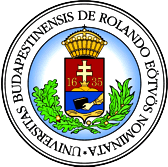
Eötvös Loránd University is a Hungarian public research university based in Budapest. Founded in 1635, ELTE is one of the largest and most prestigious public higher education institutions in Hungary. The 28,000 students at ELTE are organized into nine faculties, and into research institutes located throughout Budapest and on the scenic banks of the Danube. ELTE is affiliated with 5 Nobel laureates, as well as winners of the Wolf Prize, Fulkerson Prize and Abel Prize, the latest of which was Abel Prize winner László Lovász in 2021.

László Lovász is a Hungarian mathematician and professor emeritus at Eötvös Loránd University, best known for his work in combinatorics, for which he was awarded the 2021 Abel Prize jointly with Avi Wigderson. He was the president of the International Mathematical Union from 2007 to 2010 and the president of the Hungarian Academy of Sciences from 2014 to 2020.

Klára Dobrev is a Hungarian left-wing politician who served as Vice-President of the European Parliament between July 2019 and January 2022.

Ádám Nádasdy is a Hungarian linguist and poet. He is professor emeritus at the Department of English Linguistics of Eötvös Loránd University, Budapest. He specializes in post-generative phonological theory, morphophonology, English and Germanic historical linguistics, varieties and dialects of English, as well as English medieval studies and Yiddish philology.

László "Laci" Babai is a Hungarian professor of computer science and mathematics at the University of Chicago. His research focuses on computational complexity theory, algorithms, combinatorics, and finite groups, with an emphasis on the interactions between these fields.

Miklós Laczkovich is a Hungarian mathematician mainly noted for his work on real analysis and geometric measure theory. His most famous result is the solution of Tarski's circle-squaring problem in 1989.
Zsuzsa Máthé is a Hungarian artist. Her first exhibit opened in 1983, when she was age 18, entitled The First Exhibit of Transrealism.
The College for Advanced Studies in Social Theory is the oldest independent college of leftist-intellectual orientation at Eötvös Loránd University, the Corvinus University of Budapest as well as in Hungary.

Dezső Németh is a Hungarian psychologist and cognitive neuroscientist at Eötvös Loránd University in Budapest and research team leader in Lyon Neuroscience Research Center (CRNL) at Claude Bernard University Lyon 1.

Károly Bezdek is a Hungarian-Canadian mathematician. He is a professor as well as a Canada Research Chair of mathematics and the director of the Centre for Computational and Discrete Geometry at the University of Calgary in Calgary, Alberta, Canada. Also he is a professor of mathematics at the University of Pannonia in Veszprém, Hungary. His main research interests are in geometry in particular, in combinatorial, computational, convex, and discrete geometry. He has authored 3 books and more than 130 research papers. He is a founding Editor-in-Chief of the e-journal Contributions to Discrete Mathematics (CDM).
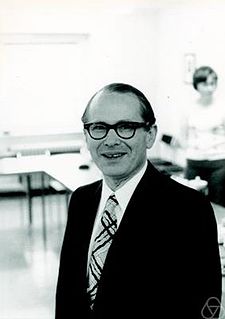
László Fuchs is a Hungarian-born American mathematician, the Evelyn and John G. Phillips Distinguished Professor Emeritus in Mathematics at Tulane University. He is known for his research and textbooks in group theory and abstract algebra.
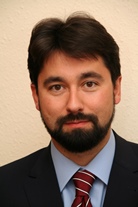
Balázs Hidvéghi is a Hungarian politician, former Member of Parliament, and also the deputy director for Strategy of Fidesz-Hungarian Civic Union responsible for Hungarian communities in the Carpathian Basin and the Hungarian diaspora.
Imre Hamar is a professor of Chinese studies at Eötvös Loránd University (Budapest). Hamar is also specialist in Huayan Buddhism.
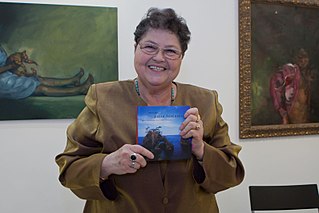
Judit Vihar is a Hungarian literary historian, Japanologist, professor emerita, translator, haiku poet and head of The Hungary–Japan Friendship Society. She has been active in the relationship between Japan and Hungary for decades. She is fluent in Hungarian, Japanese, Russian and Bulgarian.
Péter R. Surján is a Hungarian theoretical chemist who is known for his research on application of the theory of second quantization in quantum chemistry. In 2016 a festschrift from Theoretical Chemistry Accounts journal was published in his name which is also published as a book in Highlights in Theoretical Chemistry series by the Springer Nature. He is currently the dean of the faculty of science in Eötvös Loránd University.
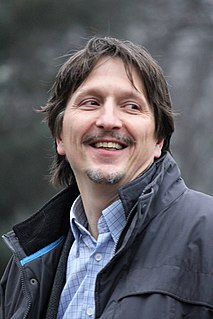
Ádám Miklósi is a Hungarian ethologist, expert on dog cognition and behavior. He holds the position of professor and the head of the Ethology Department at the Eötvös Loránd University in Budapest, Hungary. In 2016 he was elected as a corresponding member of the Hungarian Academy of Sciences. He is the co-founder and leader of the Family Dog Project, which aims to study human-dog interaction from an ethological perspective. In 2014 he published the 2nd edition of an academic volume entitled Dog Behaviour, Evolution, and Cognition by Oxford University Press

The Our Lady of the Snows Parish Church formerly called as the Blood Chapel, also called Krisztina Church, is a Catholic Church located in the Krisztina Square, Krisztinaváros, Várkerület District, Budapest. It is a protected monument.

Kata Csizér is a Hungarian linguist. She is currently a professor at the Department of English Applied Linguistics of the School of English and American Studies at Eötvös Loránd University, Hungary. Her research focuses on applied linguistics with a special focus on motivation in second-language learning and teaching students with special needs.
János Németh was a Hungarian jurist, lawyer, and professor. He was President of the Faculty of Law at Eötvös Loránd University for several decades. He was chairman of the National Election Office from 1990 to 1997 and was President of the Constitutional Court of Hungary from 1998 to 2003.